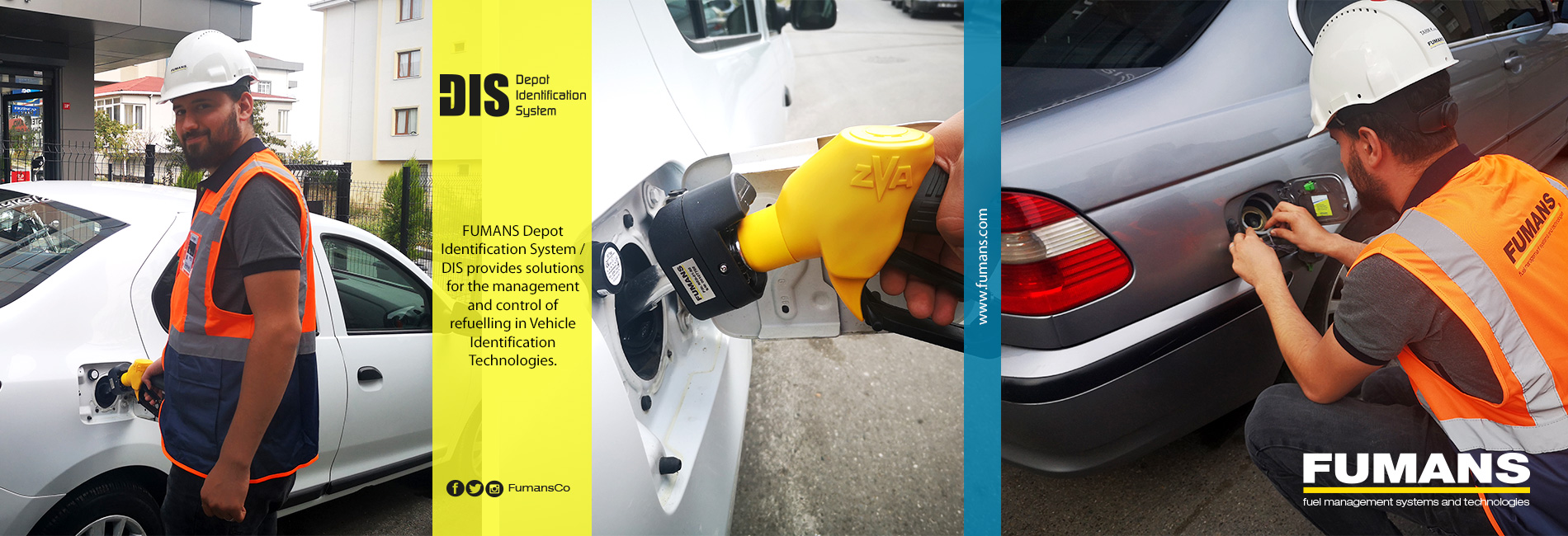Depot Identification System
FUMANS Depot Identification System / DIS provides solutions for the management and control of refuelling in Vehicle Identification Technologies.
The Depot Identification System (DIS) ensures fast and reliable refuelling. It provides important management and control opportunity for stations, distributors and businesses with fleet tracks. The vehicle tank equipped with RFID technology supplies refuelling to the vehicle which is identified by the system by means of the kit, unit and antennas used in the pump nozzle, station or construction sites. The system generates detailed reports on the fleet or customer base plate, litre amount, filling date, location and time information, km and engine runtime. The system prevents manipulation by the vehicle driver that may occur during refuelling. The pump does not deliver any fuel except to the vehicle tank. Since only the defined fuel type is supplied to the system, the possibility of incorrect replenishment is eliminated. The system works online and offline. The Depot Identification System (DIS) offers different and feasible choices, such as passive, Kilometre or Motor Run Time tracking.

(DIS) System Advantages
The Depot Identification System (DIS) offers a set of smart features designed to deliver trouble free functioning and unrivalled performance.
Passive and Active RFID in One Package
The system supports both passive and active RFID tags in the same system. Passive tags offer lowcost durability, while active tags (with autonomous battery power units) are more versatile and extend their solutions to heavy-duty trucks and machines.
Special Industrial Wireless Technology
Special Industrial Wireless Technology has been designed keeping harsh working conditions in mind. It provides a robust and reliable connection in the field. Vehicle Identification System (VIS) kits have been used for more than fifteen years. They are 100% secure, will never fail and always provide the possibility of connection to AVI solutions.
CANBUS / J1708 / J1939
The system connects to any vehicle using the advanced JAVA-based controller, offering superior performance and future customization options. Using CANBUS / J1708 / J1939 protocols, fleet managers can easily access comprehensive data from cars to light and heavy trucks.
Latest technology Java TM based Universal Station Controller
The heart of the system is the state-of-the-art Java based Universal Station Controller (USN). Using state-of-the-art software technology and methodology, the USN offers flexibility and easy integration into the future. The USN can be used as a stand-alone hardware tool, and more preferably it can be integrated into a host PC.
Simple, fast and reliable
The Depot Identification System (DIS) is easy to install. The system allows the fuel to be supplied only to the determined vehicle. If the nozzle is removed from the tank for refuelling to another vehicle, the refuelling operation can be suspended immediately to prevent unauthorized use.
The Depot Identification System (DIS) enables the control of the system by connecting to the server via the universal station unit device that controls the vehicle and station kits.
The wireless nozzle kits installed in the pump nozzle detect the Passive RFID Tag kit in the tank when the nozzle is inserted into the vehicle’s tank. During the process, the fuel type of the vehicle and the amount of fuel it can take are checked and the refuelling is approved. The mileage and engine hours from the Odometer Reader kit, along with refuelling, are transmitted to the system online. When the fuelling nozzle is taken out of the fuel tank, refuelling stops. The system works online and offline.
Hardware and Software Features
- Automatic identification of vehicle and fuel type
- Elimination of incorrect refuelling
- No filling outside the vehicle tank
- Accurate refuelling with instant system inquiry
- Possibility to participate in public tenders
- Station and distribution company loyal customer portfolio formation
- Vehicle fleet fuel expense management
- Detailed reporting on vehicle fleet or customer basis
- Elimination of loss and leakage
- Elimination of mobile technology problems
- Elimination of fuel payment process of vehicles

